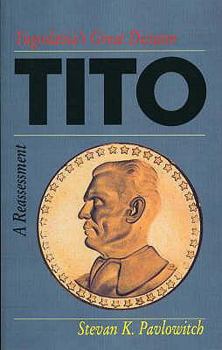Tito: Yugoslavia's Great Dictator: A Reassesment
Select Format
Select Condition 
Book Overview
This new biography offers a straightforward, balanced approach to the man who reigned over Yugoslavia for thirty-five years. Stripping away the myths about Tito and his life, Stevan Pavlowitch places... This description may be from another edition of this product.
Format:Paperback
Language:English
ISBN:1850651558
ISBN13:9781850651550
Release Date:January 1993
Publisher:Hurst & Co.
Length:119 Pages
Weight:0.40 lbs.
Customer Reviews
2 ratings
A useful and interesting overview of Tito's era.
Published by Thriftbooks.com User , 25 years ago
Pavlowitch's 110-page overview gives an excellent account of Tito's early life, the development of his political acumen in the crucible of Comintern machinations in the 1920s and 30s, his slavish devotion to Stalinist ideals, and his stubborn adherence to his own closely-held vision for Yugoslavia. This vision was the integrating theme that maintained Yugoslav unity during his long rule, but it also contained the seeds of its own ruin in that Tito's inability to respond effectively to economic crises beginning in the mid-1960s and the subsequent societal disaffection with the Communist program gave sustenance to the nationalist fever which exploded in Croatia and Bosnia in 1992 and Kosovo in 1998.Had Tito been a truly effective unifier, he would have done more than postpone the day of nationalist reckoning until ten years after his death, he would have addressed the fundamental forces underpinning nationalist yearnings.This book provides an excellent look at Tito and his contributions to Yugoslavia. Pavlowitch is especially strong in his analysis of Communist party politics and Tito's schizophrenic relations with the Soviet Union. I only wish the author had provided a more detailed explanation of Tito's economic planning. The "self-management" economy receives only a dozen words of attention. It is difficult to fault Pavlowitch on this point after he heroically struggled to compress a mass of dense material into this fine short volume, but a cursory understanding of Yugoslav economic dynamics would be invaluable to a reader who might not buy another volume about the country. Surely a few paragraphs on economics would not stretch the book unreasonably.On the nitpicking side, the book seems to have both British and American editors, as financial figures are given alternately in the British "$3,400 million" (p.77) and the American "$20-21 billion" (p.91). Also he sometimes assumes the reader has significant pre-knowledge, as when he introduces Tito's three senior lieutenants by last name only, "In the spring of 1938... he set up a provisional leadership around Djilas, Kardelj and Rankovic" (p.23) without providing further background on these individuals. I can only assume the relevant background material was left on the editing-room floor. However, these are quibbles, the book is excellent.
Tito: World Class Leader or Small-Time Autocrat?
Published by Thriftbooks.com User , 26 years ago
Stevan Pavlowitch's brief but informative biography of the late Communist dictator Josip Broz Tito offers some interesting insights into the political enigma who ruled (or, as many believe, catastrophically misruled) a colorful, diverse and unique nation known formerly as Yugoslavia. Much of what has already been written about this volatile corner of Europe focuses upon surface ideological, ethnic and religious differences. Pavlowitch goes further, arguing the different ethnic subgroups comprising the southern Slavs had widely diverging sociopolitical cultures based upon their lengthy but often-resisted subjugation by two different empires--the Slovenes and Croats under Western-oriented Austria-Hungary and the Serbs and Macedons ruled by the Middle Eastern Ottoman Turks. These divergences made the prospects of a truly united and stable Yugoslavia rather dim--divergences that Tito for his entire 35-year reign was only able to gloss over with a highly public stance as a leader of the self-proclaimed "nonaligned" movement, a debt-financed economic boom based upon an odd form of limited free-market socialism and a leadership style which appeared benignly autocratic but actually lurched between secretive, intense repression and organizational paralysis if not outright chaos. Although Pavlowitch does not extensively discuss the issues surrounding today's Balkan fracas (the book was published in 1992) the author offers readers a refreshing, dispassionate analysis of the political and historical basis of this region's present problems. By doing so, Pavlowitch effectively counters the slick, oversimplified "us versus them" assessments of the mainstream news media and the shrill pronouncements of ethnic leaders which, unfortunately, have become cornerstones of many nations' Balkan policies.





